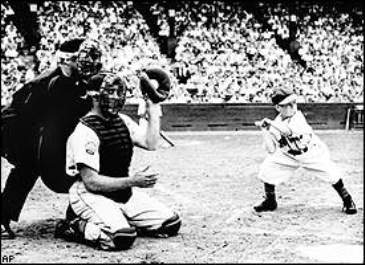The Friday Flashback: Eddie Gaedel
By Chuck Sudo in News on Aug 19, 2011 10:30PM
 60 years ago today, Eddie Gaedel became the focus of one of Bill Veeck's most notorious stunts when he became the shortest player in Major League Baseball history.
60 years ago today, Eddie Gaedel became the focus of one of Bill Veeck's most notorious stunts when he became the shortest player in Major League Baseball history.
Veeck owned the St. Louis Browns at the time conceived of the idea to have the Chicago-born Gaedel, whom he found through a booking agency, out of desperation.
It happened that 1951 was the Fiftieth Anniversary of the American League, an event the league was exploiting with its usual burst of inspiration by sewing special emblems on the uniforms of all the players. It seemed to me that a birthday party was clearly called for. It seemed to me, further, that if I could throw a party to celebrate the birthdays of both the American League and Falstaff Brewery, the sponsors would be getting a nice little tie-in and we would have their distributors and dealers hustling tickets for us all over the state. Nobody at Falstaff's seemed to know exactly when their birthday was, but that was no great problem. If we couldn't prove it fell on the day we chose, neither could anyone prove that it didn't.
The three-foot, seven-inch tall Gaedel was secretly signed by Veeck, given a uniform (with the number "1/8" on the back) and popped out of a papier-mache cake between games of a doubleheader with the Detroit Tigers. Falstaff Brewery reps weren't pleased, so Veeck kept the second surprise he had in store to himself. When the second game started, Veeck made his move.
(A)s we came up for our half of the first inning, Eddie Gaedel emerged from the dugout waving three little bats. "For the Browns," said Bernie Ebert over the loudspeaker system, "number one-eighth, Eddie Gaedel, batting for Saucier."Suddenly, the whole park came alive. Suddenly, my honored guests sat upright in their seats. Suddenly, the sun was shining. Eddie Hurley, the umpire behind the plate, took one look at Gaedel and started toward our bench. "Hey," he shouted out to Taylor, "what's going on here?"
Zack came out with a sheaf of papers. He showed Hurley Gaedel's contract. He showed him the telegram to headquarters, duly promulgated with a time stamp. He even showed him a copy of our active list to prove that we did have room to add another player.
Veeck showed Gaedel some baseball fundamentals the week before and gave him specific instructions.
I picked up a little toy bat and crouched over as far as I could, my front elbow resting on my front knee. The rules of the game say that the strike zone is between the batter's armpits and the top of his knees "when he assumes his natural stance." Since Gaedel would bat only once in his life, whatever stance he took was, by definition, his natural one.When Eddie went into that crouch, his strike zone was just about visible to the naked eye. I picked up a ruler and measured it for posterity. It was 1½ inches. Marvelous.
Eddie practiced that crouch for awhile, up and down, up and down, while I cheered him on lustily from the sidelines. After a while, he began to test the heft of the bat and glare out toward an imaginary pitcher. He sprang out of his crouch and took an awkward, lunging swing.
"No, no," I said. "You just stay in that crouch. All you have to do is stand there and take four balls. Then you'll trot down to first base and we'll send someone in to run for you."
His face collapsed. You could see his visions of glory leaking out of him. All at once, I remembered that the twist in the James Thurber story was that the midget got ambitious, swung at the 3-0 pitch and got thrown out at first base because it took him an hour and a half to run down the baseline.
"Eddie," I said gently, "I'm going to be up on the roof with a high-powered rifle watching every move you make. If you so much as look as if you're going to swing, I'm going to shoot you dead."
Gaedel did as Veeck told him, collected his $200 ($100 each in scale salary from the entertainers union and the Browns) and moved along. A few days after the stunt, Gaedel's contract was ruled invalid.
Gaedel died at the age of 36 in his South Side apartment June 18, 1961. An inquest was ordered after police noted bruising on his knees and the left side of his face and body.
Last year, the River City Rascals signed Nick Hagan to recreate the Gaedel stunt.